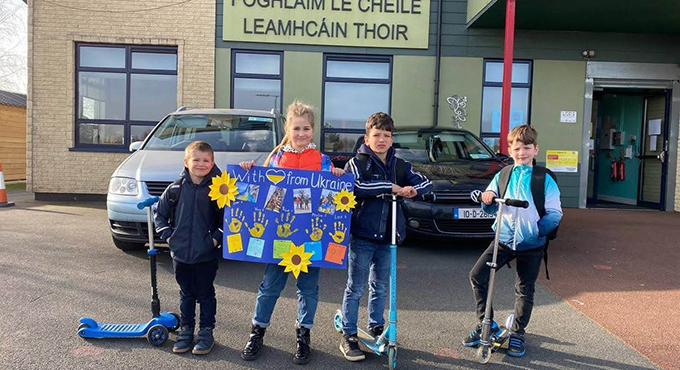
There is a social, cultural and educational gap that has become more evident in the years of pandemic and confinement. Facing it requires actions that in many cases are carried out in educational centers, but in others they must be addressed from political measures.
This is the only way to cover all sides and serve the vulnerable school population, especially those in their stages of compulsory schooling.
The situation caused by the war in Ukraine has led to the departure of millions of people who must take refuge in countries throughout Europe and other countries willing to welcome them. In Spain, for example, we have more than four thousand Ukrainian children in school, trying to ensure that their normal life does not suffer due to lack of school.
The positive effects of this schooling for their incorporation into the new life and the new society that awaits them are immediately evident. It is not new to receive people with refugee status for reasons of war, political persecution, etc. But the number of people affected, and the speed of their arrival, has exceeded all the forecasts that could be had in the immediate host countries.
It is necessary to take urgent measures to serve them adequately so that they can continue advancing in their educational process, without losing that inalienable human right.
The importance of the early years
It is in the first years of personal evolution when education will have the most repercussions on the appropriate development of the person, because, if it is interrupted (sometimes temporarily, others permanently) serious damage will be caused and indelible marks will be left on their personal and social formation. .
Without the appropriate care and initial training, minors who join Spanish society (or those from other countries) will hardly be able to develop their skills and acquire the essential skills to aspire to a decent future and meet their life expectations.
The options through which the vulnerable population is attended have two fundamental objectives: on the one hand, to prevent situations of vulnerability; on the other, overcome them.
Support options for immigrant students
- Liaison or reception classrooms, to achieve rapid learning of the vehicular language of the system.
- Interpreter and translator services, to facilitate the participation of families in educational centers and access important knowledge documentation for it.
- Itinerant support services for different centers that educate immigrant students and need guidance to serve them.
- In Spain, there are two consolidated programs in ordinary centers with a long tradition, such as the Portuguese Language and Culture Program and the Arabic Language and Moroccan Culture Program , attended by Spain, Portugal and Morocco and with teachers of origin.
Support Options for Sick Students
The vulnerable or at risk of vulnerability population includes children who need support while sick at home or in hospital. For them there is:
- Educational support units in hospital centers with pediatric beds (hospital classrooms). The school remains in the hospital and the students continue with their usual school activity.
- Home educational support service, for students who must convalesce at home, despite being discharged from hospital.
- Educational-therapeutic centres, for the care of students with psychiatric disorders during periods of serious crisis. Medical, educational and social staff attend to students and their families.
Options for socially disadvantaged students
- External collaboration programs between centers and non-profit organizations, with the aim of carrying out school reinforcements, creating work habits, accompanying unprotected students at certain times, etc.
- Legal regulation for the proper incorporation of the population into the system based on their age: workshop classrooms (in Secondary Education centers), curricular diversification programs, training units and job placement (for people over 16 years of age).
- Opening of classrooms outside school hours, which attend to the general population of the neighborhood where the center is located in culture issues: computers, library, music, dance, sports, theater, etc.
- Educational compensation programs, for students with more than two years of school lag between the course that would correspond to them by age and the one that they have by acquired skills.
- Control of school absenteeism.
- Educational mediation programs, in order to achieve conflict resolution within the center itself, the continuity of schooling throughout the compulsory stage (especially for girls, Roma or Muslim), overcoming situations of bullying, etc. They can be carried out with families and institutional staff or with the collaboration of non-profit entities or the Administrations themselves.
- Complementary measures: aid for school canteens or for the acquisition of textbooks, for example.
Permanent measures
These possibilities, which the educational system has available to prevent and overcome possible situations of vulnerability, are complemented by others, less specific, but totally transversal, which must be applied permanently:
- The continuous training of teachers.
- Maintaining the adult education network.
- Balanced schooling in all centers respecting the principles of inclusive education.
- The existence of support staff when necessary.
- The flexibility of schedule or actions to promote interculturality.
All of them will contribute effectively to try to reduce the existing social gap with the desired speed.
Author Bio: Maria Antonia Casanova is Professor at the Camilo José Cela University and Director of the Higher Institute for Educational Promotion (Madrid) at Camilo José Cela University
